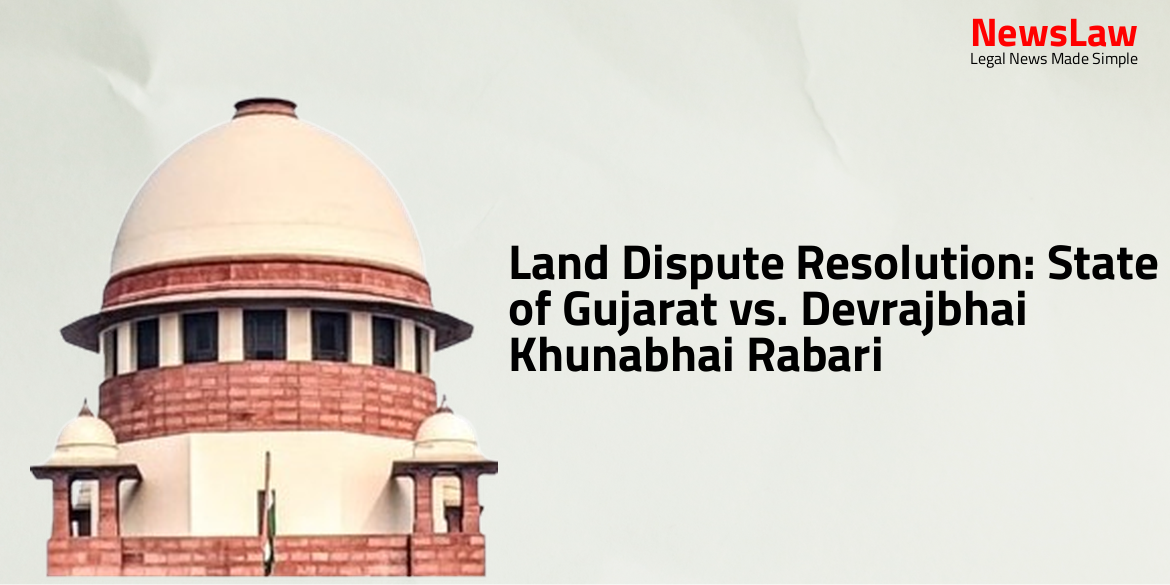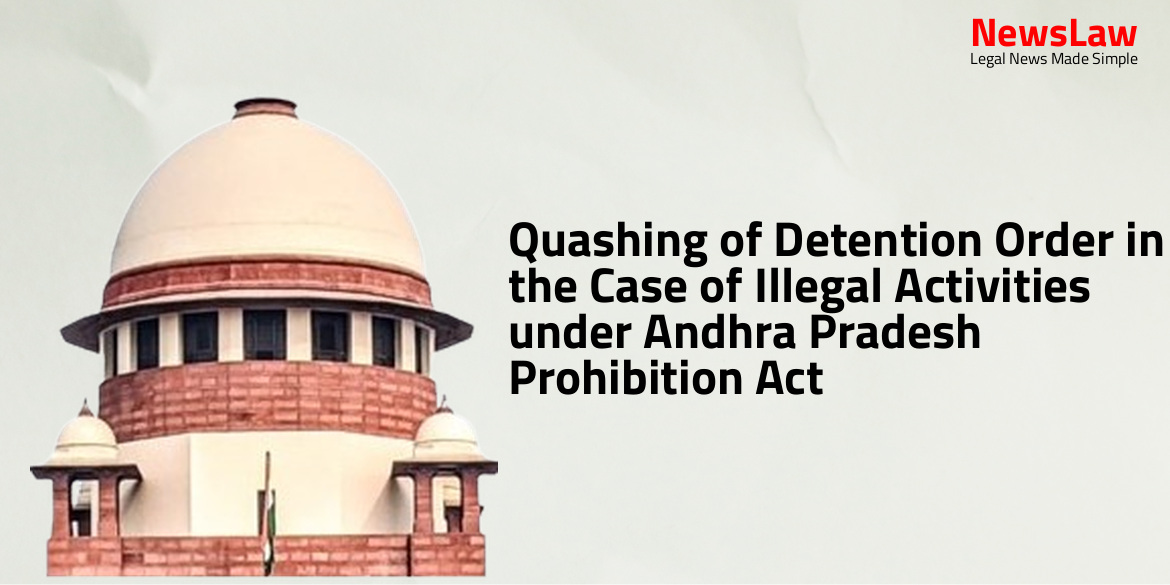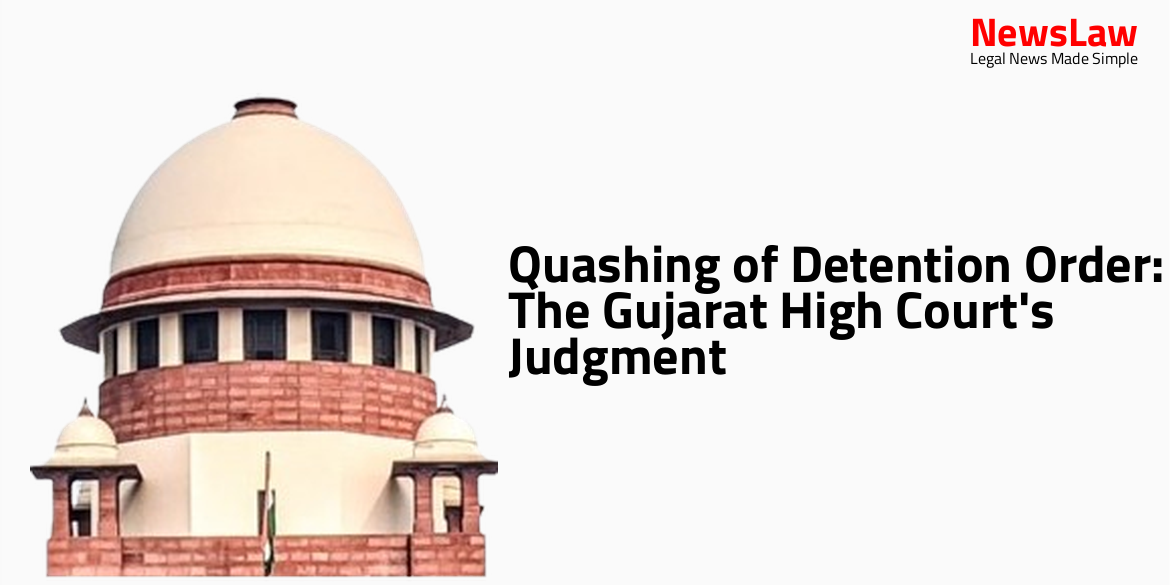In a recent landmark decision by the Gujarat High Court, a crucial land dispute case between the State of Gujarat and Devrajbhai Khunabhai Rabari has been resolved. The judgement provides clarity on the legal implications of the Urban Land Ceiling and Regulation Act. Let’s delve into the details of this case and understand the impact of the court’s ruling on land ownership rights.
Facts
- The State filed a writ petition challenging the order passed by the Urban Land Ceiling Tribunal in Appeal No Ahmedabad/5/1999 under Section 33 of the Urban Land (Ceiling and Regulation) Act, 1976.
- The learned single Judge dismissed the writ petition in his judgment dated 19.04.2014.
- The order dated 20.2.1999 passed by the Urban Land Ceiling Tribunal was upheld by the learned single Judge.
- The State’s contention against the Tribunal’s order was not accepted by the court.
- Notification under Section 10(3) of the ULC Act was issued on 23.02.1994 declaring excess vacant land acquired by the State Government.
- An appeal filed by legal heirs in 1999 challenged the order of competent authority dated 09.08.1990 regarding excess land declared from Survey No. 143/2.
- No notice or opportunity was given to the purchaser regarding the inclusion of land in ULC Act proceedings.
- Possession of the land was taken by the State Government in 1997 without the signature of the landholders.
- The appeal was allowed by the appellate authority without hearing the competent authority and was considered hopelessly barred.
- Notification under Section 10(3) on 23.02.1994 deemed the land to be vested in the State Government free from encumbrances.
- Subsequent notice under Section 10(5) on 03.07.1996 required surrender of excess land possession to the State Government within 30 days.
Arguments
- Possession of the land-in-question was taken on 12.12.1997 and vested with the government before the Repeal Act.
- Controversy over whether the transaction is affected by Section 5 of the ULC Act.
- Key question raised was regarding the actual physical possession of the land by the purchasers.
- The State’s argument that the transaction was invalid under Section 5 of the ULC Act was dismissed.
- The order declaring the land as surplus by the competent authority was upheld.
- Failure to fulfill the statutory notice requirements under Section 10(5) and 10(6) of the ULC Act.
- Proceedings under the ULC Act regarding the land-in-question abated with the Repeal Act.
- Writ petition was dismissed based on the contention that the sale transaction violated Section 5 of the ULC Act.
- The land in question was sold to Devrajbhai Khunabhai Rabari within the prescribed period before the Urban Land (Ceiling and Regulation) Act, 1976 came into force.
- The possession of the land was taken by preparation of panchnama on 12.12.1997, making the Repeal Act inapplicable to it.
- The Assistant Government Pleader argued that the transaction was hit by Section 5 of the ULC Act, making it invalid in the eyes of the law.
- Ms. Hetal Patel highlighted the effect of Section 4(4)(a) in conjunction with Section 5 of the ULC Act.
- Since the transferee did not acquire any right, title, or interest in the land, there was no necessity for issuing a notice to him.
Analysis
- In the case of State of Uttar Pradesh Vs. Hari Ram, the legal position about the effect of the Repeal Act was discussed.
- Notice under Section 10(5) of the ULC Act was required to be given to the land holder and any person in possession of the land-in-question, asking for surrender of possession to the State Government within 30 days.
- No notice was given to the respondent purchaser regarding the possession of the land-in-question.
- As per the Apex Court’s decision, since the physical possession of the land-in-question was with the respondent purchaser, the notice requirement was not fulfilled.
- The panchnama only refers to the names of two witnesses, and the land-in-question has been declared surplus and vested with the State Government under the ULC Act.
- The competent authority has not provided independent findings on the bonafide nature of the transaction, but rather rejected the claim of the landholder for exemption based on lack of proof.
- The notices issued under Section 10(5) and 10(6) did not give the State Government cause to dispossess the actual occupant of the land.
- The physical possession of the land-in-question was not clearly documented in the panchnama, raising questions about the process of possession transfer.
- The vesting of the land under Section 10(3) does not automatically confer possession rights to the State Government without proper procedures of voluntary surrender or forceful dispossession.
- The Repeal Act and its implications on possession transfer were discussed in relation to the specific case.
- The procedure followed by the competent authority in taking possession of the excess land was found to be inadequate, leading to the conclusion that the landholder should benefit from Section 4 of the Repeal Act.
- The importance of notices under Section 10(5) and (6) before dispossessing the occupier of the land-in-question was emphasized, highlighting the mandatory nature of the process.
- The failure to establish any required situations by the State Government led to the respondent being entitled to the benefits of Section 4 of the Repeal Act.
- The analysis also included references to specific sections of the ULC Act, such as Section 4(4)(a) and the implications of non-compliance with notices under Section 10(5) and (6).
- Persons holding vacant land in excess of ceiling limit must file a statement with competent authority.
- Statement must specify location, extent, value, and other particulars of vacant lands held.
- Competent authority may extend the deadline for filing the statement if necessary.
- If a person held vacant land in excess of ceiling limit before the Act or at the Act’s commencement, they must file a statement.
- Definition of ‘commencement of this Act’ includes various scenarios like when the Act comes into force in a state or when any land becomes vacant land.
- It is the State’s responsibility to prove voluntary surrender of vacant land and peaceful possession.
- The State must establish forceful dispossession if claimed under Section 10.
- The decision of the learned single Judge was found error-free based on the above principles.
Decision
- The orders as to costs were not provided in the judgement.
- Ceiling proceedings for the land-in-question were abated with the enforcement of the Repeal Act, 1999.
- The Appeal was dismissed due to lack of merits.
- The holder of the land-in-question is entitled to the benefits of Section 4 of the Repeal Act, 1999.
Case Title: THE STATE OF GUJARAT Vs. LEGAL HEIRS OF SHIVABHAI VIRABHAI PRAJAPATI
Case Number: R/LPA/977/2018



